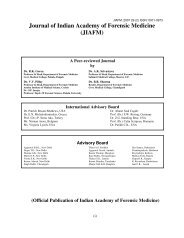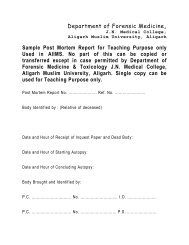Download - forensic medicine
Download - forensic medicine
Download - forensic medicine
You also want an ePaper? Increase the reach of your titles
YUMPU automatically turns print PDFs into web optimized ePapers that Google loves.
JIAFM, 2007 - 29(4); ISSN: 0971-0973<br />
Doctor and Law<br />
* Dr. T.K.K. Naidu, MD, LLB.<br />
* Professor & Head, Department of Forensic Medicine, Medico legal consultant, Prathima Institute of<br />
Medical Sciences, Nagunoor, Karimnagar – 505 417 (A.P.)<br />
E-mail: naidutkk@yahoo.com, naidutkk@rediffmail.com<br />
Abstract<br />
After the Consumer Protection Act, 1986, came into effect, a number of patients have filed cases against doctors.<br />
This article presents a summary of legal decisions related to medial negligence: what constitutes negligence in<br />
civil and criminal law, and what is required prove it.<br />
Public awareness of medical negligence in India is growing. Hospital managements are increasingly facing<br />
complaints regarding the facilities, standards of professional competence, and the appropriateness of their<br />
therapeutic and diagnostic methods. After the Consumer Protection Act, 1986, has come into force some patients<br />
have filed legal cases against doctors, have established that the doctors were negligent in their medical service,<br />
and have claimed and received compensation. As a result, a number of legal decisions have been made on what<br />
constitutes negligence and what is required to prove it.<br />
Civil law and negligence:<br />
Negligence is the breach of a legal duty to care. It<br />
means carelessness in a matter in which the law<br />
mandates carefulness. A breach of this duty gives a<br />
patient the right to initiate action against negligence.<br />
Persons who offer medical advice and treatment<br />
implicitly state that they have the skill and<br />
knowledge to do so, that they have the skill to<br />
decide whether to take a case, to decide the<br />
treatment, and to administer that treatment. This is<br />
known as an “implied undertaking” on the part of a<br />
medical professional. In the case of the State of<br />
Haryana Vs Smt. Santra, the Supreme Court held<br />
that every doctor “has a duty to act with a<br />
reasonable degree of care and skill” (1).<br />
Doctors in India may be held liable for their services<br />
individually or vicariously unless they come within<br />
the exceptions specified in the case of Indian<br />
Medical Assoication Vs V P Santha (2). Doctors are<br />
not liable for their services individually or vicariously<br />
if they do not charge fees. Thus free treatment at a<br />
non-government hospital, government hospital,<br />
health center, dispensary or nursing home would not<br />
be considered a “service” as defined in Section 2 (1)<br />
(0) of the Consumer Protection Act, 1986.<br />
However, no human being is perfect and even the<br />
most renowned specialist could make a mistake in<br />
detecting or diagnosing the true nature of a disease.<br />
A doctor can be held liable for negligence only if one<br />
can prove that she/he is guilty of a failure that no<br />
doctor with ordinary skills would be quality of if<br />
acting with reasonable care (3). An error of<br />
judgement constitutes negligence only if a<br />
reasonably competent professional with the<br />
standard skills that the defendant professes to have,<br />
and acting with ordinary care, would not have made<br />
the same error (4).<br />
In a key decision on this matter in the case of Dr.<br />
Laxman Balkrishna Joshi Vs Dr. Trimbak Bapu<br />
Godbole, the Supreme Court held that if a doctor<br />
has adopted a practice that is considered “proper”<br />
by a reasonable body of medical professionals who<br />
are skilled in that particular field, he or she will not<br />
be held negligent only because something went<br />
wrong.<br />
Doctors must exercise an ordinary degree of skill (5).<br />
However, they cannot give a warranty of the<br />
perfection of their skill or a guarantee of cure. If the<br />
doctor has adopted the right course of treatment, if<br />
she/he is skilled and has worked with a method and<br />
manner best suited to the patient, she/he cannot be<br />
blamed for negligence if the patient is not totally<br />
cured (6).<br />
Certain conditions must be satisfied before liability<br />
can be considered. The person who is accused<br />
must have committed an act of omission or<br />
commission, that act must have been in breach of<br />
the person’s duty; and this must have caused harm<br />
to the inured person. The complainant must prove<br />
the allegation against the doctor by citing the best<br />
evidence available in medical science and by<br />
presenting expert opinion (7).<br />
In some situations the complainant can invoke the<br />
principle of res ispa loquitur or “the thing speaks for<br />
itself”. In certain circumstances no proof of<br />
negligence is required beyond the accident itself.<br />
The National Consumer Disputes Redressal<br />
Commission applied this principle in Dr. Janak<br />
Kantimathi Nathan Vs Murlidhar Eknath Masane (8).<br />
The principle of res ipsa loquiture comes into<br />
operation only when there is proof that the<br />
occurrence was unexpected, that the accident could<br />
72


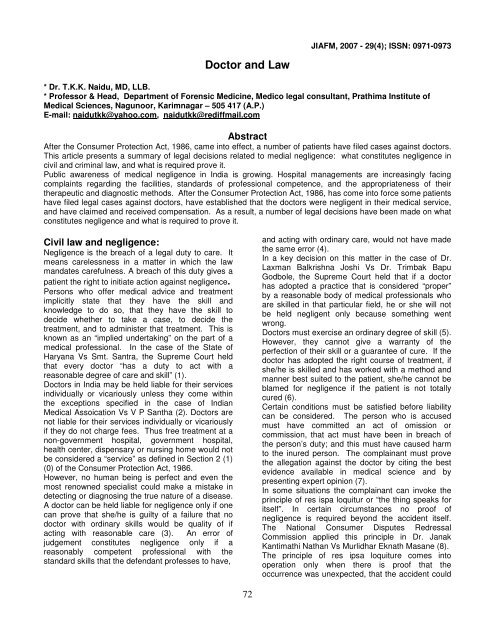
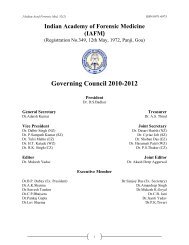
![syllabus in forensic medicine for m.b.b.s. students in india [pdf]](https://img.yumpu.com/48405011/1/190x245/syllabus-in-forensic-medicine-for-mbbs-students-in-india-pdf.jpg?quality=85)
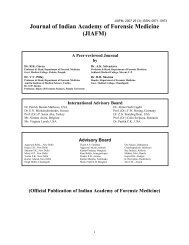
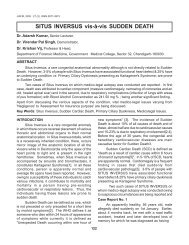
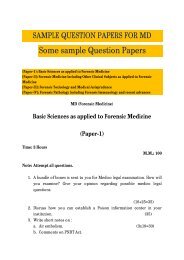
![SPOTTING IN FORENSIC MEDICINE [pdf]](https://img.yumpu.com/45856557/1/190x245/spotting-in-forensic-medicine-pdf.jpg?quality=85)
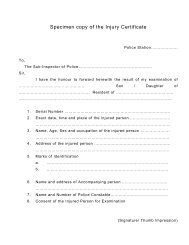
![JAFM-33-2, April-June, 2011 [PDF] - forensic medicine](https://img.yumpu.com/43461356/1/190x245/jafm-33-2-april-june-2011-pdf-forensic-medicine.jpg?quality=85)
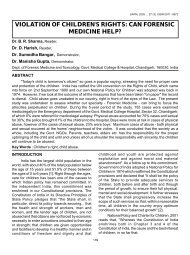
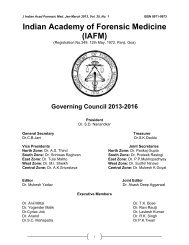
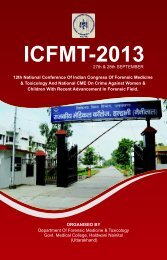
![JIAFM-33-4, October-December, 2011 [PDF] - forensic medicine](https://img.yumpu.com/31013278/1/190x245/jiafm-33-4-october-december-2011-pdf-forensic-medicine.jpg?quality=85)
